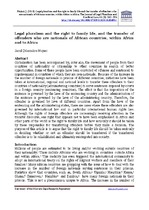Legal pluralism and the right to family life and the transfer of offenders who are nationals of African countries, within Africa to Africa
Abstract
Globalisation has been accompanied by, inter alia, the movement of people from
their countries of nationality or citizenship to other countries in search of better
opportunities. Some of these people have been convicted of offences and sentenced
to imprisonment in countries of which they are non-nationals. Because of the
increase in the number of foreign nationals in prisons of different countries, initiatives
have been taken at international, regional and national levels to transfer these
offenders to their countries of nationality (administering countries) to serve sentences
imposed by courts in a foreign country (sentencing countries). The effect is
that the imposition of the sentence is governed by the laws of the sentencing country
and the administration of the sentence is governed by the laws of the administering
country. Therefore, the offender is governed by laws of different countries.
Apart from the laws of the sentencing and the administering states, there are cases
where these offenders are also governed by international law and in particular
international human rights law. Although the rights of foreign offenders are
increasingly receiving attention in the transfer discourse, one right that appears not
to have been emphasised in Africa and other parts of the world is the right to family
life and how seriously it should be taken by those responsible for transferring
offenders before they make a decision. The purpose of this article is to argue that
the right to family life should be taken seriously in deciding whether or not an
offender should be transferred if the transferred offender is to be rehabilitated and
ultimately reintegrated into society.

